
Story
14:14, 08-Jun-2019
Hunters to protectors – the story of saving endangered Yunnan snub-nosed monkeys
CGTN
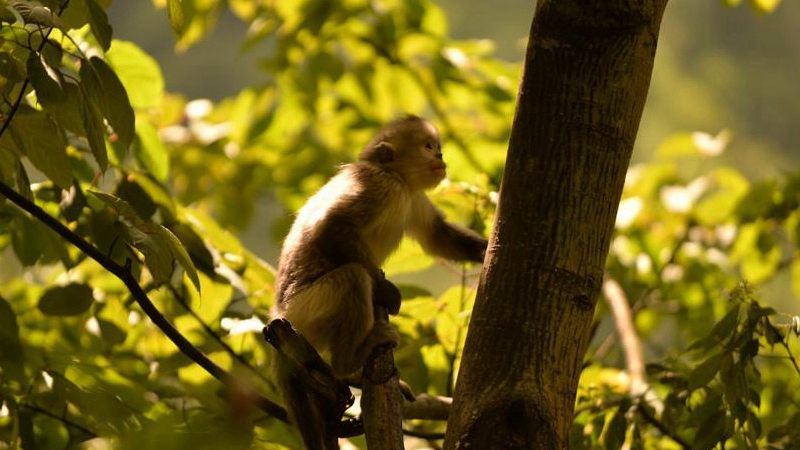
Yu Jianhua has incredible skills. He can tell different emotions in the calls of the Yunnan snub-nosed monkeys, also known as the black-and-white snub-nosed monkeys.
He can also identify each of the 68 monkeys under his care via their appearances.
"They are my family," says Yu, 67, a monkey ranger for 22 years. "I'm with them every day."
A member of the Lisu ethnic group, Yu works deep in the remote mountains of southwest China's Yunnan Province. His home in Xiangguqing Village of Weixi County is also in this area and is a nine-hour drive from the provincial capital of Kunming.
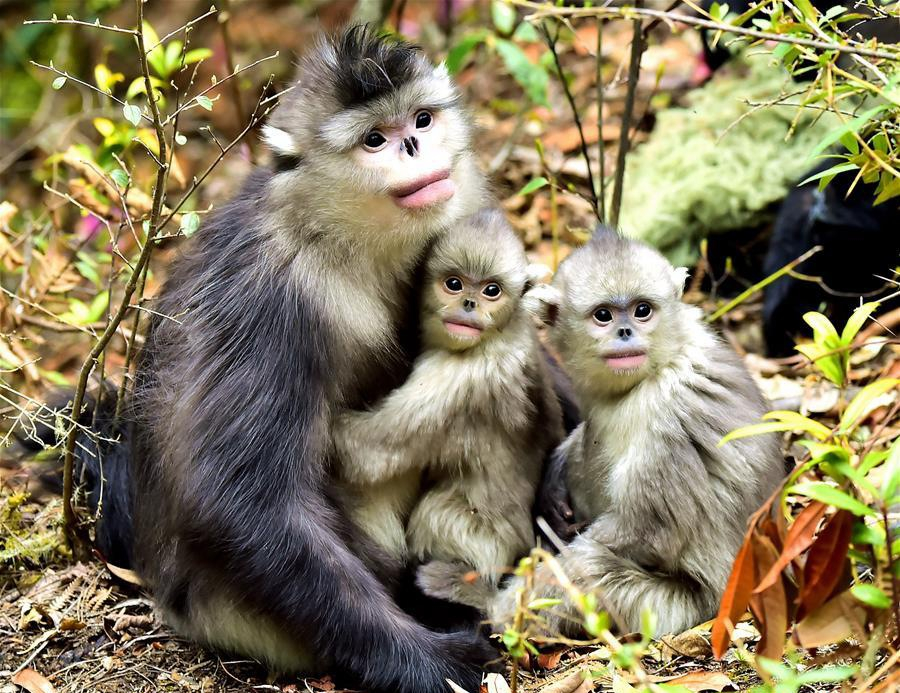
A Yunnan snub-nosed monkey with offspring. /Xinhua Photo
A Yunnan snub-nosed monkey with offspring. /Xinhua Photo
Life of transformation
Once a hunter, Yu converted to a ranger in 1997 after persuasion from the local forestry authority.
"My grandfather said that the Yunnan snub-nosed monkeys were considered a human ancestor in Lisu's tale," Yu recalled. "We must protect them."
It is not an easy job for the 40 or so full-time monkey rangers in Weixi County.
They work two shifts, each patrolling the forest for more than 10 hours every day over an altitude ranging from 3,000 to 3,400 meters.
The rangers have to avoid walking the same route each time in order to protect the vegetation, said Zhong Tai, director of Weixi County nature reserve department.
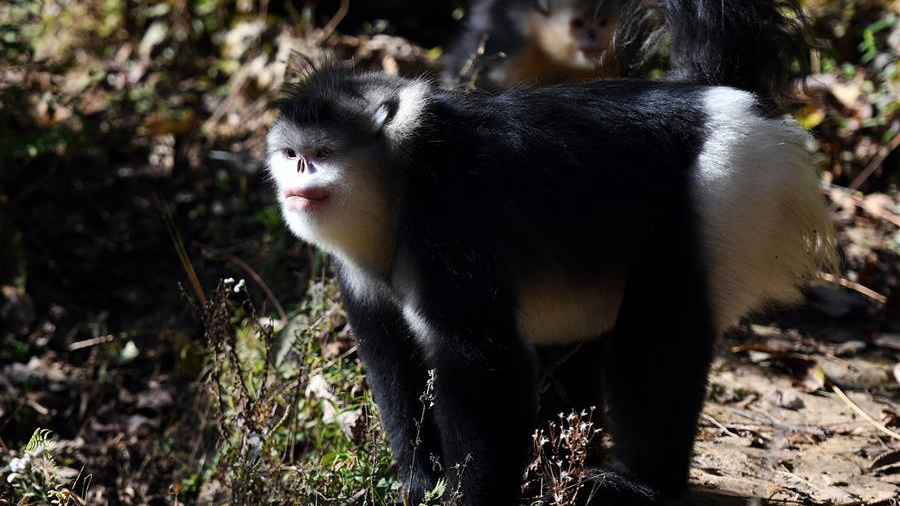
A Yunnan snub-nosed monkey at the Baima Snow Mountain Nature Reserve. /Xinhua Photo
A Yunnan snub-nosed monkey at the Baima Snow Mountain Nature Reserve. /Xinhua Photo
"Sometimes our rangers need to stay overnight in the forest if the patrol goes past midnight," said Zhong.
The situation is improving for both human and monkeys. In the beginning, Yu only earned 180 yuan (about 26 U.S. dollars) per month. Now his salary has increased to around 1,600 yuan (about 232 U.S. dollars).
About 2,000 Yunnan snub-nosed monkeys are estimated to be around Xiangguqing village in the 2,816-square-kilometer Baima Snow Mountain Nature Reserve, which is home to 87 animal species.
The Yunnan are among the world's most endangered primates. They are often considered as an indicator of healthy biodiversity in the high-altitude region because of their reliance on its surroundings.
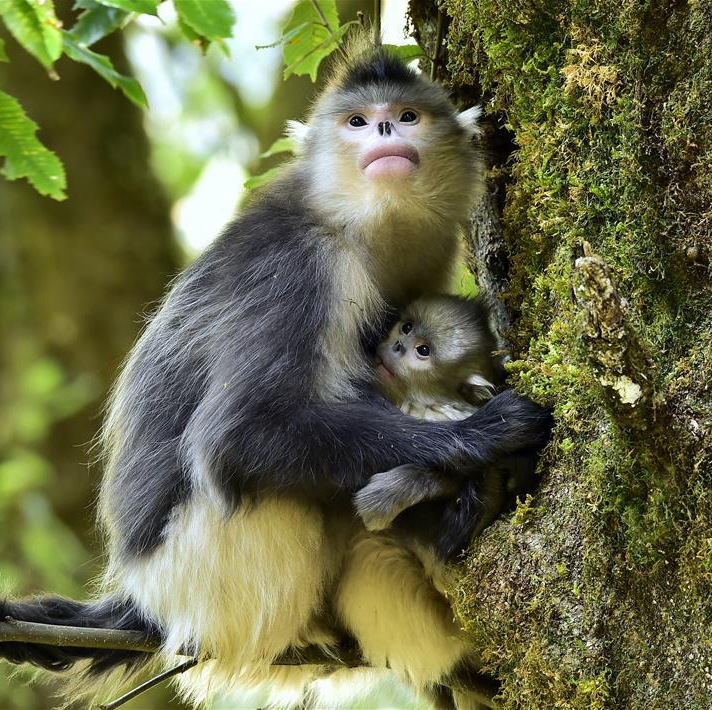
A mother monkey forages for her favorite lichen with baby in arms. /Xinhua Photo
A mother monkey forages for her favorite lichen with baby in arms. /Xinhua Photo
In the 1980s, local poachers nearly drove them to extinction, but the population has since increased to more than 3,000 nationally, thanks to the joint efforts of governments, researchers and local villagers.
National effort
The Baima Snow Mountain Nature Reserve lies in Yunnan Province's Deqen Tibetan Autonomous Prefecture. It was established in 1983 and became a national nature reserve in 1986. It was the first targeted area for scientific research into the Yunnan snub-nosed monkeys.
Local authorities had been encouraging the people to engage in protecting this endangered species.
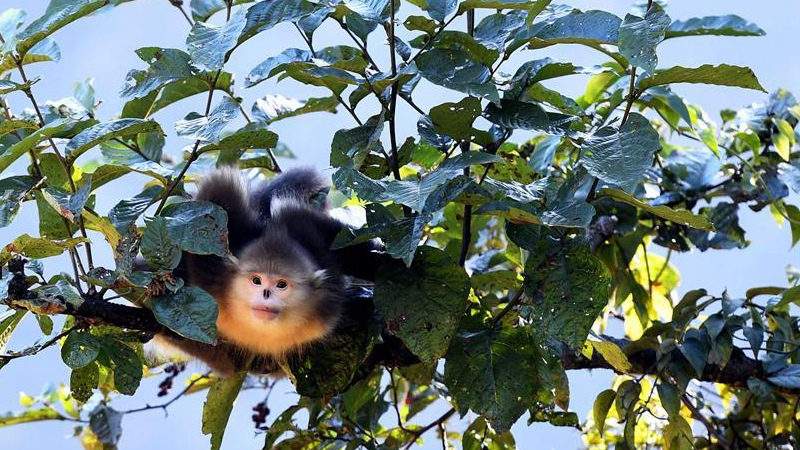
This monkey is having a lot of fun on a tree. /Xinhua Photo
This monkey is having a lot of fun on a tree. /Xinhua Photo
"Everybody in the community knows the rivers, forests, and vegetation here better than any outsider. Though they once made a living by stripping resources from their surrounding environment, nobody really wants to see their homes destroyed," said Zhong Tai.
"We have worked with the community to instruct villagers in the preservation and the consequences of poaching, helping them turn from hunters to protectors."
Nationwide, hundreds of thousands of villagers like Yu now work as rangers to protect the environment.
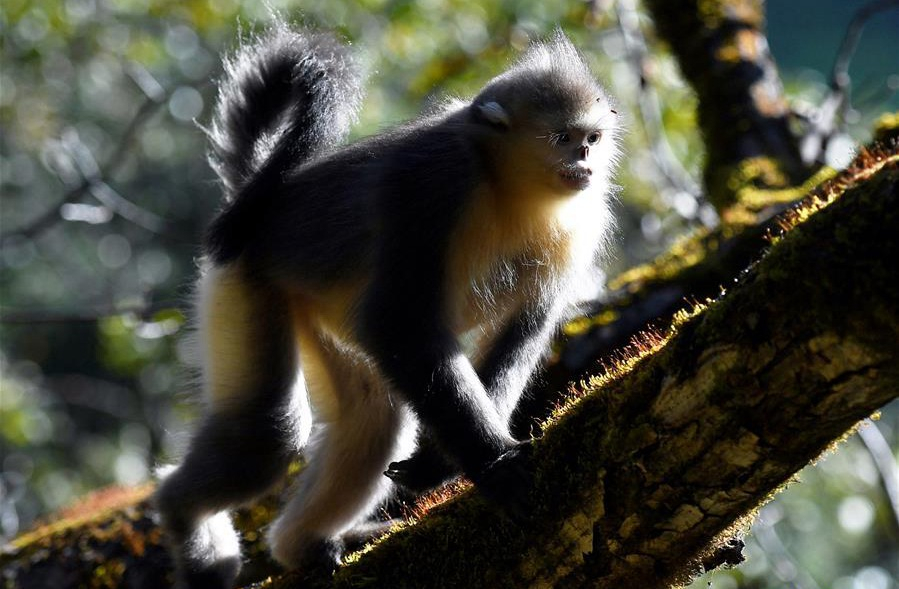
The Yunnan snub-nosed monkeys spend most of their time on trees. /Xinhua Photo
The Yunnan snub-nosed monkeys spend most of their time on trees. /Xinhua Photo
Technical progress
The reserve staff spread the monkeys' natural food such as lichen, peanuts, corn, dried apples, and pumpkin seeds, around the forest and closely monitor their health.
Then the rangers would collect the monkeys' droppings once a month. "If more than five types of parasite eggs are found in the droppings, the monkeys will be treated with medicine in fruit or carrots," Zhong said.
Baima Snow Mountain Nature Reserve has produced a handbook and field survey table with 17 patrol routes and 56 monitoring sites around Xiangguqing village.
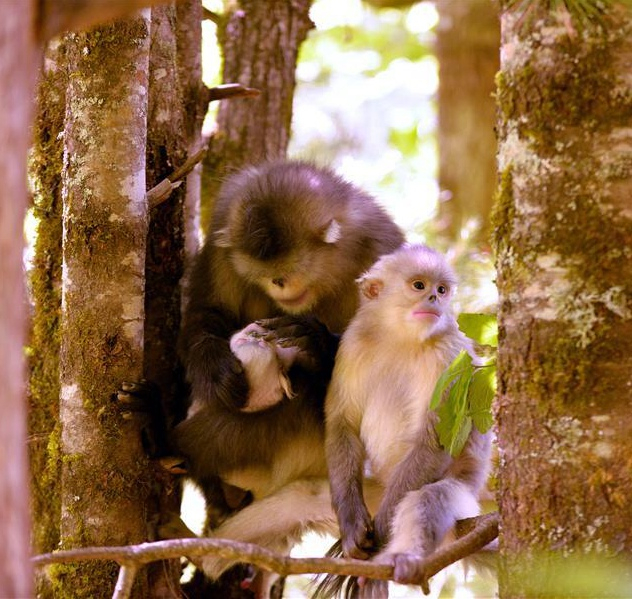
A mother monkey and her children resting on a tree branch. /Xinhua Photo
A mother monkey and her children resting on a tree branch. /Xinhua Photo
Professor Xiao Wen, from the Institute of Eastern-Himalaya Biodiversity Research of Dali University, said the Yunnan snub-nosed monkey is a flagship species because its movement through the dense forest canopy can expose the floor to sunlight, heat, and water, thus benefiting the whole forest.
Xiao Wen's research team used a 3D map-based interview survey method to monitor the terrain, vegetation and water conditions of the monkeys' habitat. They also plan to build a field-monitoring network for biodiversity protection in other regions.
(Cover image via Xinhua.)
(If you want to contribute and have specific expertise, please contact us at nature@cgtn.com.)
Source(s): Xinhua News Agency

SITEMAP
Copyright © 2018 CGTN. Beijing ICP prepared NO.16065310-3
Copyright © 2018 CGTN. Beijing ICP prepared NO.16065310-3